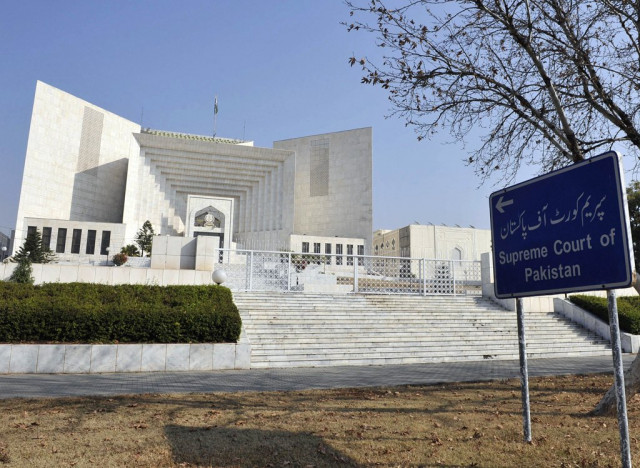Nawaz no-show: SC issues second notice to former PM in disqualification time-period case
Top court will determine whether disqualification is permanent or not

PHOTO: AFP
While the team of top Pakistan Muslim League –Nawaz (PML-N) leader did not appear, Pakistan Tehreek-e-Insaf (PTI) leader Jahangir Tareen along with his counsel Sikandar Bashir Mohman were present in the courtroom.
A five-judge larger bench of the apex court, headed by Chief Justice Mian Saqib Nisar and comprising Justice Azmat Saeed Sheikh, Justice Umar Ata Bandial, Justice Ijaz ul Ahsan and Justice Sajjad Ali Shah, took up 17 cases related to the disqualification of parliamentarians.
SC summons Nawaz Sharif, Jahangir Tareen in disqualification limit case
14 members of the National Assembly (NA) had submitted petitions for clarification of the parameters of the disqualification. The SC clubbed all petitions together and The larger bench will determine whether their disqualification under Article 62(1)(f) is perpetual.
The Chief Justice of Pakistan (CJP) Mian Saqib Nisar remarked during the hearing that he did not want to deprive anyone from the chance of presenting themselves. “For this reason, two names came to mind, Nawaz Sharif and Jahangir Tareen,” the CJP said. He noted that Tareen was present while Nawaz was not.
The CJP further observed that the parliament is bound to obey the Constitution.
The chief justice said that we have said on a number of occassions that the parliament is supreme but parliament is bound to obey the Constitution at all costs.
Justice Nisar also said that it is the fundamental right of any citizen to contest the elections and present proceedings are relevant to everyone. "This is the key issue, we are issuing public notices to all affected people that they may join the court proceedings. We issued notices to former prime minister Nawaz Sharif too in case he wants to be part of the matter. However, if nobody will appear then we will proceed ex parte," the CJP said.
Another judge on the bench, Justice Azmat Saeed Sheikh observed that there are three ways to disqualify parliamentarians. One is disqualifying through tribunal under Article 225 of the Constitution.
Other is disqualification through conviction by court of law in any matter and third is disqualification through quo warranto wherein MPAs can be directly disqualified by the Supreme Court and high court.
Babar Awan, counsel for applicant, stated that 17 judges should hear this matter because there are judgments of larger benches on similar matter.
The Supreme Court had earlier issued notices to Nawaz Sharif and Jahangir Tareen to appear before the court in a matter related to the determination of time-period of disqualification under Article 62(1)(f) of the Constitution.
The larger bench will determine whether their disqualification under Article 62(1)(f) is perpetual. The court ordered the two leaders to appear in person or through counsel.
Legal experts believe that the proceedings on the matter will be significant because it will decide the fate of several parliamentarians, including Nawaz and Tareen, who have been disqualified under the said article on the charges of concealing their assets in nomination papers as election candidates.
SC larger bench to determine lifetime disqualification issue
Lawyers believe these parliamentarians may get relief if the Supreme Court declares that disqualification under Article 62(1)(f) is time-specific.
They believe that the court should allow disqualified parliamentarians to contest the elections and let the people decide about their future.
At present, former chief justice Iftikhar Muhammad Chaudhry’s judgments are in force, holding that disqualification under the article is for life.
However, some earlier verdicts did not envisage permanent disqualification.


















COMMENTS
Comments are moderated and generally will be posted if they are on-topic and not abusive.
For more information, please see our Comments FAQ